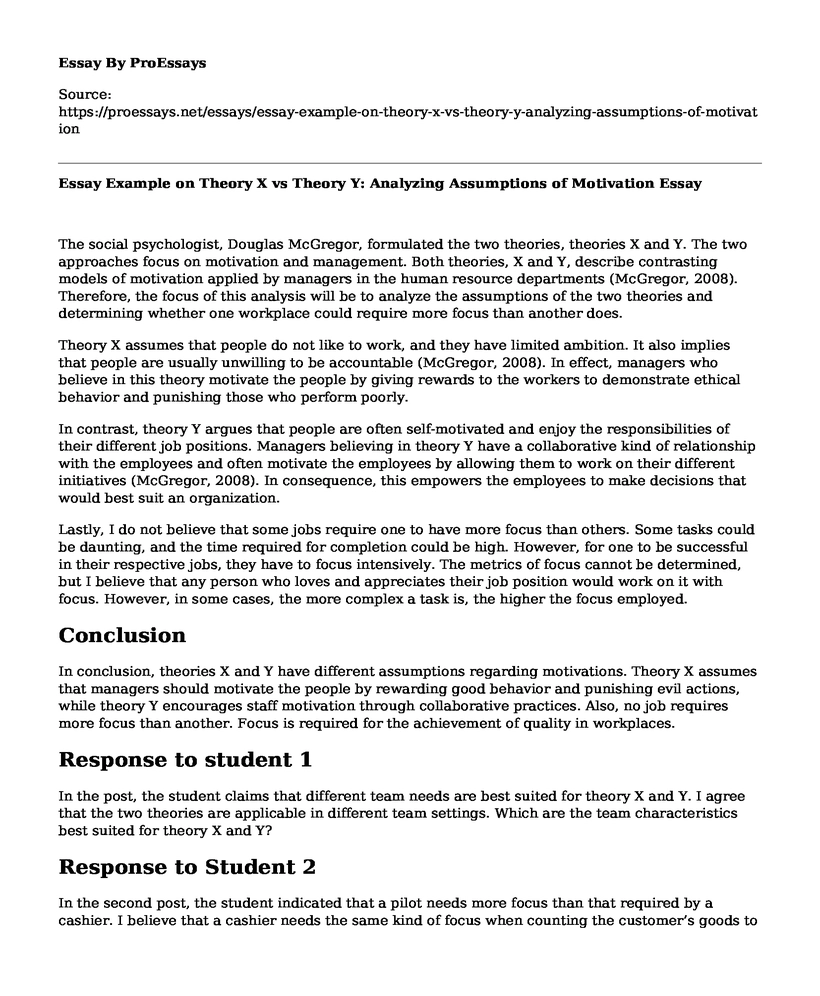The social psychologist, Douglas McGregor, formulated the two theories, theories X and Y. The two approaches focus on motivation and management. Both theories, X and Y, describe contrasting models of motivation applied by managers in the human resource departments (McGregor, 2008). Therefore, the focus of this analysis will be to analyze the assumptions of the two theories and determining whether one workplace could require more focus than another does.
Theory X assumes that people do not like to work, and they have limited ambition. It also implies that people are usually unwilling to be accountable (McGregor, 2008). In effect, managers who believe in this theory motivate the people by giving rewards to the workers to demonstrate ethical behavior and punishing those who perform poorly.
In contrast, theory Y argues that people are often self-motivated and enjoy the responsibilities of their different job positions. Managers believing in theory Y have a collaborative kind of relationship with the employees and often motivate the employees by allowing them to work on their different initiatives (McGregor, 2008). In consequence, this empowers the employees to make decisions that would best suit an organization.
Lastly, I do not believe that some jobs require one to have more focus than others. Some tasks could be daunting, and the time required for completion could be high. However, for one to be successful in their respective jobs, they have to focus intensively. The metrics of focus cannot be determined, but I believe that any person who loves and appreciates their job position would work on it with focus. However, in some cases, the more complex a task is, the higher the focus employed.
Conclusion
In conclusion, theories X and Y have different assumptions regarding motivations. Theory X assumes that managers should motivate the people by rewarding good behavior and punishing evil actions, while theory Y encourages staff motivation through collaborative practices. Also, no job requires more focus than another. Focus is required for the achievement of quality in workplaces.
Response to student 1
In the post, the student claims that different team needs are best suited for theory X and Y. I agree that the two theories are applicable in different team settings. Which are the team characteristics best suited for theory X and Y?
Response to Student 2
In the second post, the student indicated that a pilot needs more focus than that required by a cashier. I believe that a cashier needs the same kind of focus when counting the customer’s goods to ensure that they charge the right amount of money to products. What is the student’s definition of focus in workplaces and what are some of its benefits?
References
McGregor, D.,(2008). The Human Side of Enterprise. Place of publication not identified: McGraw-Hill Professional.
Cite this page
Essay Example on Theory X vs Theory Y: Analyzing Assumptions of Motivation. (2023, Sep 04). Retrieved from https://proessays.net/essays/essay-example-on-theory-x-vs-theory-y-analyzing-assumptions-of-motivation
If you are the original author of this essay and no longer wish to have it published on the ProEssays website, please click below to request its removal:
- Essay Sample on Gender Roles
- Out of This Furnace: the US Economy in the Period Between 1880 to 1920 Essay
- Essay Sample on Unsettled World
- Essay Sample on ADHD Disease
- Dominant Culture: White Anglo-Saxon Protestants in American Society - Research Paper
- American Youth Incarceration: Race Disparities in Justice System - Essay Sample
- Hippocampus and Depression: The Biological Link - Essay Sample







